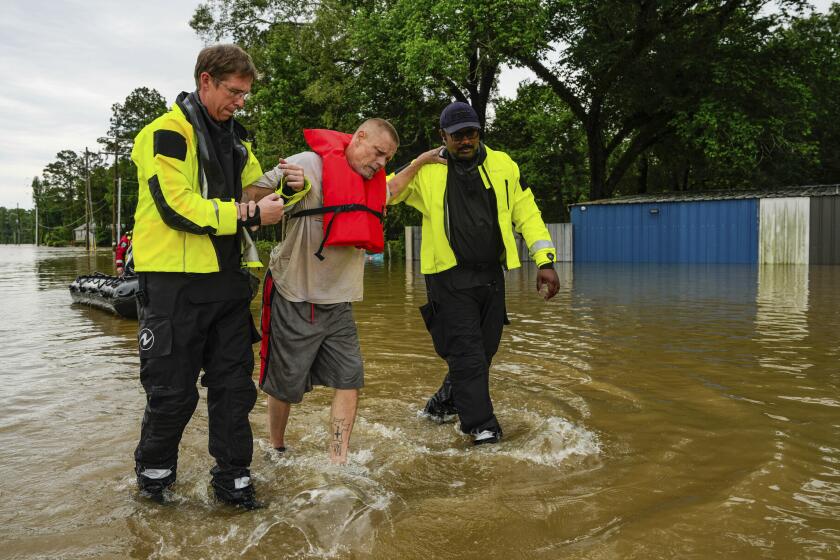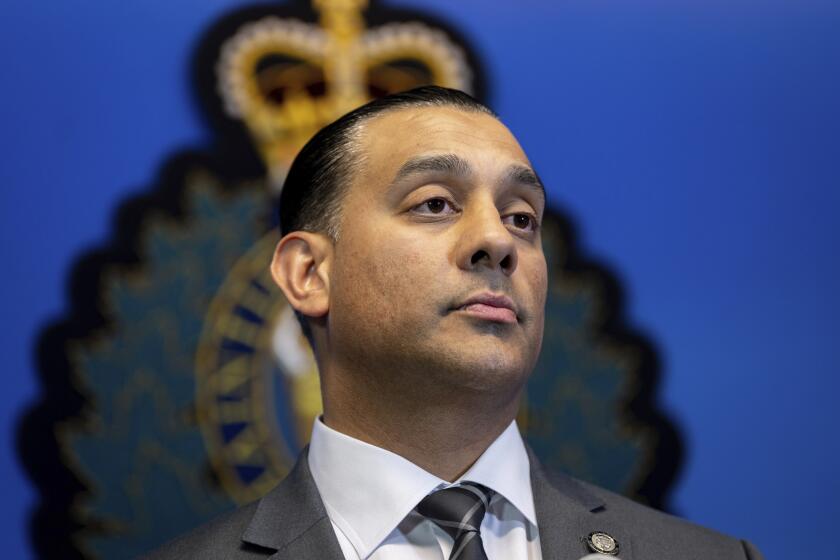Attempt to Open Bridge Heightens Tensions in Croatia : Balkans: Large-scale shelling breaks out between Croats, Serbs. U.N. source warns of ‘a very dangerous impasse.’
Tensions have again escalated in southern Croatia after a weekend attempt to open a strategic bridge near Serbian-occupied territories sparked large-scale shelling on both sides and threatened negotiations for a new cease-fire agreement, U.N. officials said Monday.
Monitors in the area said some Serbian forces appeared to be moving out of Bosnia-Herzegovina and into Croatia’s Krajina region in what could be preparations for a new outbreak of fighting.
“There is indeed a deterioration in the military situation throughout the sector,” one U.N. source said. “It is a very dangerous impasse we are in.”
As peace talks in Bosnia brought at least a temporary slowdown in Bosnian Serb military involvement there, some officials were concerned that the Serbs may turn their attention back to Croatia, where lagging attempts to implement a cease-fire agreement have spawned fears of a new outbreak of fighting between Croats and Serbs. The Serbs occupy more than a fourth of Croatia’s territory.
“The talks in Bosnia are basically getting somewhere, and now with the fighting there diminishing, at least with the Serbs, there is a realistic possibility that they are going where the fight still goes on: to Croatia,” a U.N. official said.
Serbian occupation of the vast Krajina region, just inland from the sea, has cut Croatia off from its vital tourist industry and crucial ports on the coast.
In July, the Croats tried to open a bridge connection across the Maslenica Gorge, which links northern Croatia with the Dalmatian coast, and to open an airport nearby on territory recaptured from the Serbs in a brief period of fighting in January.
Serbian forces in the Krajina region responded by shelling the bridge, sinking one of its pontoons and leaving it closed to civilian traffic for the past month. Serbs also blasted more than 70 shells into the front-line Croatian city of Karlovac in the July 15 attack.
A new attempt to open the bridge Sunday sparked a similar response and an outbreak of shelling along both sides of the line of confrontation in southern Croatia. The United Nations reported several hundred rounds fired throughout the neighboring region but had no firm reports on the extent of damage to the bridge.
“Yesterday was a very bad day. All around (the south) there was a lot of artillery fire in a lot of areas. It’s a very dangerous situation, and both sides, in order to prevent a very serious escalation, are going to have to exercise enormous control over their forces,” said Cedric Thornberry, civil affairs chief for the United Nations in Zagreb. “It simply has to be resolved, and at the moment neither side is showing much flexibility.”
As tensions rose in Croatia, fighting continued in central Bosnia as the Muslim-led government prepared to reach a decision by the end of the week on a proposed partition of the country among Croats, Serbs and Muslims.
Thornberry was preparing to return today to central Bosnia in an attempt to negotiate delivery of badly needed relief supplies to Muslims trapped in eastern Mostar, where there has been heavy fighting between Muslims and Croats.
An initial U.N. assessment over the weekend found that some of the 35,000 Muslims in Mostar could die of starvation within five days if food is not delivered. Hospitals are without medicine and water is contaminated, aid agencies reported. More than 500 cases of dysentery and other gastrointestinal ailments have been diagnosed.
“I’m still in a profound state of shock from what I saw in Mostar,” said Thornberry, who visited the city over the weekend.
Meanwhile, the new level of hostilities in Croatia raised questions about a proposed cease-fire agreement under discussion since last week, which Croatian military officials said would require both sides to withdraw heavy weaponry within 12 miles of the line of confrontation.
U.N. negotiators say the agreement has been held up by a dispute over timing: The Serbs say they are ready to sign the cease-fire but won’t implement it until Croatian forces first withdraw from territories seized in the January conflicts. The Croats say they will withdraw only after a cease-fire has been implemented.
Croatian officials say the underlying problem is that the United Nations has failed to implement previous resolutions that recognize all of the Serb-occupied lands as Croatian national territories.
“The Serbs have certain illusions that it is possible to create their own state within the Croatian state, or to be able to annex part of the Croatian territory to Serbia. As long as they have this illusion, there is not going to be a peaceful solution,” Col. Drago Krpina, head of the Croatian Defense Ministry’s political department, said in an interview.
But U.N. officials say the Croats have slowed down a resolution by insisting on opening the Maslenica bridge in violation of past agreements.
“The Serbs are really the good guys now. They have complied with the agreements, they have been very, very cooperative,” said one source close to the negotiations. “But the situation now is more dangerous than ever. Because all of this is in a situation where people are really fed up, and it’s feeding the arguments of those who want a military solution on both sides. Every day that passes gives more fuel to the hard-liners.”
More to Read
Start your day right
Sign up for Essential California for news, features and recommendations from the L.A. Times and beyond in your inbox six days a week.
You may occasionally receive promotional content from the Los Angeles Times.






